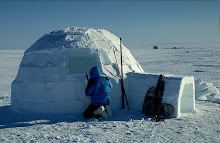Ernst Hemingway (1899-1961) was an expatriate American writer. His writing career started with a stint as reporter for the Kansas City Star in 1917. His short stories and novels are noted for their understated and succinct writing style, which evolved from his journalistic style. He once said that his writing was influenced by the Star's style guide : "Use short sentences. Use short first paragraphs. Use vigorous English. Be positive, not negative."
Hemingway's novels include "The Sun Also Rises", "For Whom the Bell Tolls" , "A Farewell to Arms" and "The Old Man and the Sea."
Hemingway lived and wrote in Paris after World War I. Many of his novels focus on Americans living in Europe after the war. His novels also include manly activities as bullfighting, the running of the bulls in Pamplona, and hunting trips. His writing is categorized by economy in writing, featuring stoic male protagonists who exhibit what is known as "grace under pressure." His writing -the style, characters and themes- had a great influence on the development of modern fiction. He was a contemporary of F. Scott Fitzgerald, Gertrude Stein, and Ezra Pound ( remember him? Imagists?) who was Hemingway's artistic mentor for a time. Hemingway said"Ezra was right half the time, and when he was wrong, he was so wrong you were never in any doubt about it."
The short stories of Hemingway we will read are:
The Snows of Kilimanjaro
The Killers
The Short happy Life of Francis Macomber
As we read these short stories ( actual short stories, not novellas like Kafka's Metamorphosis), watch for how Hemingway uses economy of language to tell his story, to describe people and settings, and how his use of dialogue fleshes out a story or character.
We will also evaluate whether or not Papa ( Hemingway's nickname) stuck to his Kansas City Star style manual guidelines, using short sentences, short first paragraphs, vigorous English.
Since these stories are so short, we will try to read & annotate them in one sitting, with discussion and analysis for the remainder of the week.

2 comments:
I think our entire class will be thrilled to hear that Hemingway's short stories are not "Kafkaesque" novellas. Hey, Kafkaesque is actually a word! On November 30, 2006, a federal judge called the Federal Emergency Agency "Kafkaesque," because the body did not provide enough aid to Hurricane Katrina victims. (Evidently, though, the term "Kafkaesque" was coined much earlier.)
Vanessa, that is an awesome conection! And, if we take Kafka's writing as having Zeno's Paradox as a "character", what does that say about FEMA & Hurricane Katrina?
IMHO, Hemingway will be *much* easier to read & analyze than Kafka.
Post a Comment